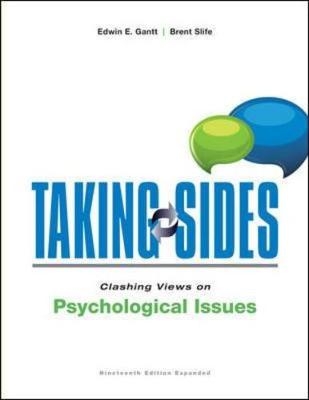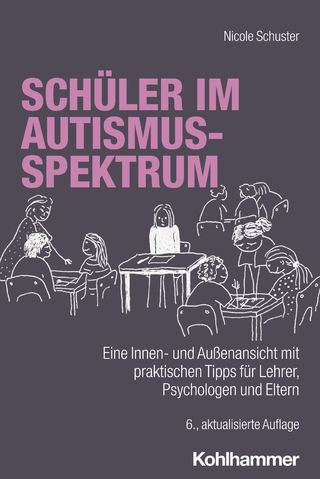
Taking Sides: Clashing Views on Psychological Issues, 19/e Expanded
McGraw-Hill Education (Verlag)
978-1-259-43161-6 (ISBN)
- Titel ist leider vergriffen;
keine Neuauflage - Artikel merken
The Taking Sides Collection on McGraw-Hill Create™ includes current controversial issues in a debate-style forma designed to stimulate student interest and develop critical thinking skills. This Collection contains a multitude of current and classic issues to enhance and customize your course. You can browse the entire Taking Sides Collection on Create or you can search by topic, author, or keywords. Each Taking Sides issue is thoughtfully framed with Learning Outcomes, an Issue Summary, an Introduction, and an "Exploring the Issue" section featuring Critical Thinking and Reflection, Is There Common Ground?, Additional Resources, and Internet References. Go to the Taking Sides Collection on McGraw-Hill Create™ at www.mcgrawhillcreate.com/takingsides and click on "Explore this Collection" to browse the entire Collection. Select individual Taking Sides issues to enhance your course, or access and select the entire Gantt, Taking Sides: Clashing Views on Psychological Issues, 19/e Expanded book here at http://create.mheducation.com/createonline/index.html#qlink=search%2Ftext%3Disbn:1259431614 for an easy, pre-built teaching resource. Visit http://create.mheducation.com for more information on other McGraw-Hill titles and special collections.
Unit 1: Biological Issues
Issue 1. Is Evolution a Good Explanation for Psychological Concepts?
Yes: Glenn Geher, from "Evolutionary Psychology Is Not Evil! (...and Here's Why...)", Psychological Topics (2006).
No: Edwin E. Gantt and Brent S. Melling, from "Evolutionary Psychology Isn't Evil, It's Just Not Any Good", Original Work (2009).
Evolutionary psychologist Glenn Geher maintains that evolution provides the best meta-theory for explaining and understanding human psychology. Theoretical psychologists Edwin Gantt and Brent Melling argue that an evolutionary account of psychology omits many important and good things about humans.
Issue 2. Is Homosexuality Biologically Based?
Yes: Jacques Balthazart, from "Minireview: Hormones and Human Sexual Orientation", The Endocrine Society (2011).
No: Stanton L. Jones and Alex W. Kwee, from "Scientific Research, Homosexuality, and the Church's Moral Debate: An Update", Christian Association for Psychological Studies, Inc (2005).
Neuroendocrinologist Jacques Balthazart argues that the prenatal endocrine environment has a significant influence on human sexual orientation, and that genetic differences affecting behavior, either in a direct manner or by changing embryonic hormone secretion or action, may also be involved in determining life-long sexual orientation. Professor of psychology Stanton L. Jones and clinical psychologist Alex W. Kwee claim the current research on the biology of homosexuality provides no firm evidence for biological causation and leaves room for learning models for sexual orientation.
Issue 3. Is Free Will an Illusion?
Yes: Arnold Modell, from "The Agency of the Self and the Brain's Illusions", Psychological Agency: Theory, Practice, and Culture (2008).
No: Eddy Nahmias, from "Why We Have Free Will", Scientific American (2015).
Arnold Modell, a professor of social psychiatry at the Harvard Medical School, argues that free will is simply a necessary illusion in our lives. To support his point, he cites scientific research that seems to provide evidence that the causes of our actions occur before we are conscious of them. He also argues that our feelings arise without our conscious choice or volition. Eddy Nehmias, a professor of philosophy at Georgia State University, argues an opposing view to those who see free will as an illusion. He argues that we need not accept the conclusion that free will is simply an illusion just because fMRIs show neurons firing a split second before a choice is made. In other words, he argues that brain activity cannot sufficiently account for conscious human actions.
Unit 2: Research Issues
Issue 4. Is American Psychological Research Generalizable to Other Cultures?
Yes: Gerald J. Haeffel et al., from "Theory, Not Cultural Context, Will Advance American Psychology", American Psychological Association (2009).
No: Jeffrey Jensen Arnett, from "The Neglected 95%, a Challenge to Psychology's Philosophy of Science", American Psychological Association (2009).
Gerald Haeffel and his colleagues believe that psychological studies of American people often generalize to people of other cultures, especially when basic processes are being studied. Jeffrey Arnett, psychological research professor, argues that culture is central to the functioning of humans and thus to psychological findings.
Issue 5. Are Traditional Empirical Methods Sufficient to Provide Evidence for Psychological Practice?
Yes: American Psychological Association, from "Report of the 2005 Presidential Task Force on Evidence-Based Practice", American Psychological Association (2006).
No: Brent D. Slife and Dennis C. Wendt, from "The Next Step in the Evidence-Based Practice Movement", Speech or Remarks (2006).
The APA Presidential Task Force on Evidence-Based Practice assumes that a variety of traditional empirical methods is sufficient to provide evidence for psychological practices. Psychologist Brent D. Slife and researcher Dennis C. Wendt contend that traditional empirical methods are guided by a single philosophy that limits the diversity of methods.
Issue 6. Should Neuroscience Research Be Used to Inform Law Practices?
Yes: Oliver R. Goodenough and Micaela Tucker, from "Law and Cognitive Neuroscience", Annual Review of Law and Social Science (2010).
No: Jay D. Aronson, from "The Law's Use of Brain Evidence", Annual Review of Law and Social Science (2010).
Oliver Goodenough and Micaela Tucker argue that cognitive neuroscience offers an exciting and ambitious research agenda for addressing a variety of thorny political and social issues relating to law and the American justice system. Jay D. Aronson, a professor of history at Carnegie Mellon University, argues that although cognitive neuroscience has brought forth a number of findings relating to law, it fails to truly understand the link between brain activity and behavior or memory formation, and cannot solve important legal and ethical questions relating to law.
Issue 7. Is Psychology a Science?
Yes: Robert E. Silverman, from "Is Psychology a Science?", Skeptic (2013).
No: Peter Rickman, from "Is Psychology Science?", Philosophy Now (2009).
Robert E. Silverman, an academic psychologist writing in Skeptic Magazine, presents a brief history of psychology and a few of its main figures while addressing the role of science in psychology. He argues that over time psychology has become more scientific (i.e., more objective in observations and measurement). He concludes that as the current partnership of psychology and neuroscience grows stronger there will be no question that psychology is indeed a science. Peter Rickman, formerly professor of philosophy at City University in London, argues that psychology is not a science like physics and other natural sciences because although it shares certain aspects of the scientific method, it must and does rely on the methods of hermeneutics. He argues that because observable facts are not the data being studied in psychology, but rather meaningful communication, psychology must always consider context and background in its research. The scientific method is not sufficient for psychology to accomplish this task.
Unit 3: Development Issues
Issue 8. Are Violent Video Games Harmful to Children and Adolescents?
Yes: Steven F. Gruel, from "Brief of Amicus Curiae in Case of Brown v. Entertainment Merchants Association", U.S. Supreme Court (2010).
No: Patricia A. Millett, from "Brief of Amicus Curiae in Case of Brown v. Entertainment Merchants Association", U.S. Supreme Court (2010).
Prosecutor Steven F. Gruel, in arguing before the Supreme Court, cites what he says is an overwhelming amount of research support to conclude that viewing violence causes children to act more violently. Defense attorney Patricia A. Millett argues before the Supreme Court that psychological research about the effects of media violence on children is inconclusive, with these researchers making claims about causation that cannot be substantiated.
Issue 9. Does Parent Sexual Orientation Affect Child Development?
Yes: Peter Sprigg, from "New Study on Homosexual Parents Tops All Previous Research: Children of Homosexuals Fare Worse on Most Outcomes", Family Research Council (2012).
No: Carmine D. Boccuzzi, from "Brief of Amicus Curiae of the American Sociological Association in behalf of Appellants", American Sociological Association (2013).
Peter Sprigg of the Family Research Council recapitulates the arguments and findings of Mark Regnerus, concluding that the idea that children of homosexual parents are no different than children of heterosexual parents and, thus, are unharmed by the gender of their parents is a myth. Attorney Carmine Boccuzzi and colleagues, critiquing that the methods and findings of the Regnerus study and other similar studies, argue that children of homosexual parents are just as well off as children of heterosexual parents in most aspects of life.
Unit 4: Cognitive-Emotional Issues
Issue 10. Can Positive Psychology Make Us Happier?
Yes: Stephen M. Schueller and Acacia C. Parks, from "The Science of Self-Help: Translating Positive Psychology Research into Increased Individual Happiness", Hogrefe Publishing (2014).
No: Laurel C. Newman and Randy J. Larsen, from "How Much of Our Happiness Is Within Our Control?", Original Work (2009).
Positive psychologists Stephen M. Schueller and Acacia C. Parks present a summary of the current state of positive psychological interventions as they pertain to self-help, interventions that have been shown to lead to increases in individual happiness. Psychologists Laurel Newman and Randy Larsen challenge the external validity and sustainability of the effects of these strategies, arguing that most of what influences our long-term happiness is outside our control.
Issue 11. Is Emotional Intelligence Valid?
Yes: John D. Mayer, Peter Salovey, and David R. Caruso, from "Emotional Intelligence: New Ability or Eclectic Traits?", American Psychological Association (2008).
No: Gerald Matthews, Moshe Zeidner, and Richard D. Roberts, from "The Science, the Myth, and the Future of Emotional Intelligence", Bradford Books (of MIT Press) (2002).
Psychologists John Mayer, Peter Salovey, and David Caruso maintain that some individuals have a greater emotional intelligence (EI), a greater capacity than others to carry out sophisticated information processing about emotions. Psychologists Gerald Matthew, Moshe Zeidner, and Richard Roberts contend that the concept of emotional intelligence, as currently understood, is fundamentally flawed, having no reliable foundation in biological, cognitive, coping, or personality models of human behavior.
Unit 5: Mental Health Issues
Issue 12. Does an Elective Abortion Lead to Negative Psychological Effects?
Yes: Priscilla K. Coleman, from "Abortion and Mental Health: Quantitative Synthesis and Analysis of Research Published 1995-2009", Royal College of Psychiatrists (2011).
No: Jon Knowles and Deborah Golub, from "The Emotional Effects of Induced Abortion", Planned Parenthood Federation of America (2007).
Priscilla Coleman conducted an analysis of hundreds of studies regarding the mental health of women after receiving an abortion and concludes that the research indicates that abortion does not lead to negative mental health effects. Jon Knowles cites multiple studies that evidence a variety of populations and circumstances that do not result in post-abortion mental health issues.
Issue 13. Is Attention-Deficit Hyperactivity Disorder (ADHD) a Real Disorder?
Yes: National Institute of Mental Health, from "Attention Deficit Hyperactivity Disorder", National Institute of Mental Health (2006).
No: Sami Timimi and Nick Radcliffe, from "The Rise and Rise of ADHD", PCCS Books (2005).
The National Institute of Mental Health asserts that ADHD is a real disorder that merits special consideration and treatment. Timimi and Radcliffe insist that ADHD is not a medical disorder as it has no demonstrable biological cause; rather, it is not a disorder at all, but an agenda-driven, socially constructed entity invented by Western society.
Issue 14. Are Fathers Necessary for Children's Well-Being?
Yes: Sean E. Brotherson and Joseph M. White, from "Why Fathers Count: Fatherhood and the Future of Our Children", Meridian Magazine (2007).
No: Jane Waldfogel, Terry-Ann Craigie, and Jeanne Brooks-Gunn, from "Fragile Families and Child Well-Being", Future of Children (2010).
Researchers Sean E. Brotherson and Joseph M. White make the case that fathers play a crucial and irreplaceable role in the lives of their children, with effective fathering being strongly tied to lower levels of poverty, depression, behavioral challenges, and higher levels of cooperation, academic achievement, and other traits. Jane Waldfogel, Terry-Ann Craigie, and Jeanne Brooks-Gunn, in a detailed analysis of various family structures, find that family instability has a negative effect on children’s cognitive and health outcomes, regardless of structure, meaning that children with single or cohabiting parents are not necessarily at risk.
Unit 6: Psychotherapy Issues
Issue 15. Are All Psychotherapies Equally Effective?
Yes: Mark A. Hubble, Barry L. Duncan, and Scott D. Miller, from "Introduction to The Heart and Soul of Change: What Works in Therapy", American Psychological Association (1999).
No: Jedidiah Siev, Jonathan D. Huppert, and Dianne L. Chambless, from "The Dodo Bird, Treatment Technique, and Disseminating Empirically Supported Treatments", The Behavior Therapist (2009).
Psychologists Mark Hubble, Barry Duncan, and Scott Miller argue that all effective therapies are essentially alike, while all ineffective therapies are ineffective in their own way. In addition, while many different psychotherapies are effective in relieving the suffering of patients, all of these therapies are effective because of the factors they all possess in common, not for any unique belief or procedure a therapy may possess. Psychologists Jedidiah Siev, Jonathan Huppert, and Dianne Chambless assert that outcomes among the various psychotherapies differ primarily because one technique or therapy is better than another.
Issue 16. Should Therapists Be Eclectic?
Yes: Jean A. Carter, from "Theoretical Pluralism and Technical Eclecticism", American Psychological Association (2006).
No: Don MacDonald and Marcia Webb, from "Toward Conceptual Clarity with Psychotherapeutic Theories", Journal of Psychology and Christianity (2006).
Counseling psychologist Jean Carter insists that the continued improvement and effectiveness of psychotherapy requires that techniques and theories include the different approaches of psychological theory and practice through an eclectic approach. Professors of psychotherapy Don MacDonald and Marcia Webb contend that eclecticism creates an unsystematic theoretical center for psychological ideas and methods that ultimately limits overall therapeutic effectiveness.
Unit 7: Social Issues
Issue 17. Can Psychotherapy Change Sexual Orientation?
Yes: Joseph Nicolosi, A. Dean Byrd, and Richard W. Potts, from "Retrospective Self-Reports of Changes in Homosexual Orientation: A Consumer Survey of Conversion Therapy Clients", Psychological Reports (2000).
No: A. Lee Beckstead, from "Can We Change Sexual Orientation?", Archives of Sexual Behavior (2012).
Nicolosi, Byrd, and Potts surveyed a large number of individuals who self-identified as homosexual—both before and after receiving conversion therapy—to determine whether the therapy was an effective means of changing sexual orientation. Psychotherapist A. Lee Beckstead reviews current psychological attitudes toward homosexuality and concludes that treatment to change sexual orientation is more likely to harm than the help.
Issue 18. Can Sex Be Addictive?
Yes: Patrick Carnes, from "Understanding Sexual Addiction", SIECUS Report (2003).
NO: Lawrence A. Siegel and Richard M. Siegel, from "Sex Addiction: Recovering from a Shady Concept", Original Work (2007).
Sexual addiction expert Patrick J. Carnes argues not only that sex can be addictive but also that sex can be as addictive as drugs, alcohol, or any other chemical substance. Sex therapists Lawrence A. Siegel and Richard M. Siegel believe that while some sexual behaviors might be dysfunctional, calling those behaviors “addictive” confuses a moralistic ideology with a scientific fact.
Issue 19. Is Excessive Use of Social Media a Form of Narcissism?
Yes: Soraya Mehdizadeh, from "Self-Presentation 2.0: Narcissism and Self-Esteem on Facebook", Cyberpsychology, Behavior, and Social Networking (2010).
No: Alex Lambert, from "Discovering Intimacy on Facebook", Macmillan Publishers (2013).
Soraya Mehdizadeh examines how narcissism and self-esteem are manifest on Facebook. Her study reveals that individuals who rate higher in narcissism and lower in self-esteem tend to use Facebook significantly more than those who score lower in narcissism and higher in self-esteem. Alex Lambert, a researcher of new media at University of Melbourne, reviews the arguments against the narcissism hypothesis. He claims that Facebook use is primarily about seeking intimacy with other people and not about fulfilling narcissistic desires.
| Erscheint lt. Verlag | 16.9.2015 |
|---|---|
| Verlagsort | OH |
| Sprache | englisch |
| Maße | 216 x 277 mm |
| Gewicht | 696 g |
| Themenwelt | Geisteswissenschaften ► Psychologie ► Familien- / Systemische Therapie |
| Geisteswissenschaften ► Psychologie ► Sozialpsychologie | |
| Sozialwissenschaften | |
| ISBN-10 | 1-259-43161-4 / 1259431614 |
| ISBN-13 | 978-1-259-43161-6 / 9781259431616 |
| Zustand | Neuware |
| Haben Sie eine Frage zum Produkt? |
aus dem Bereich


